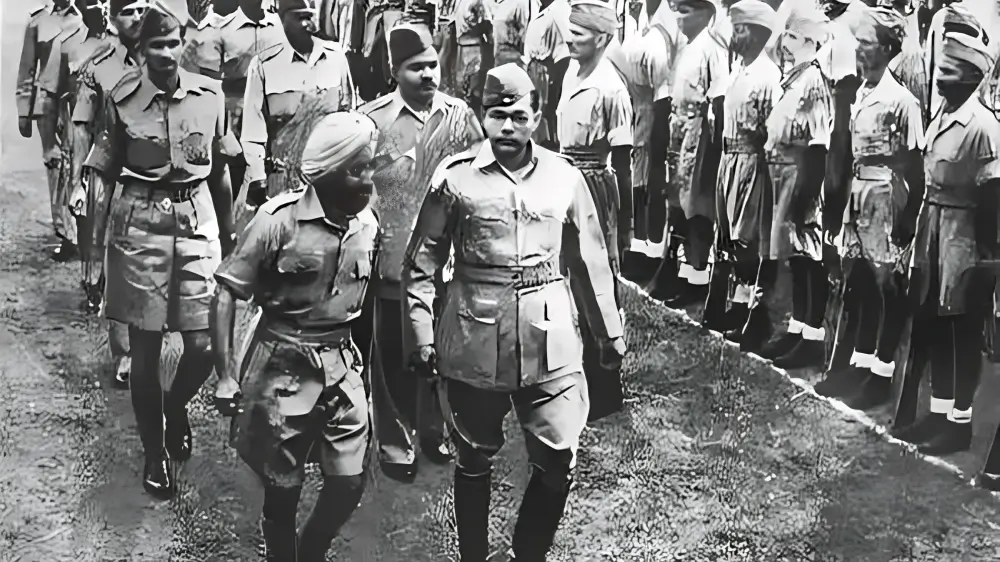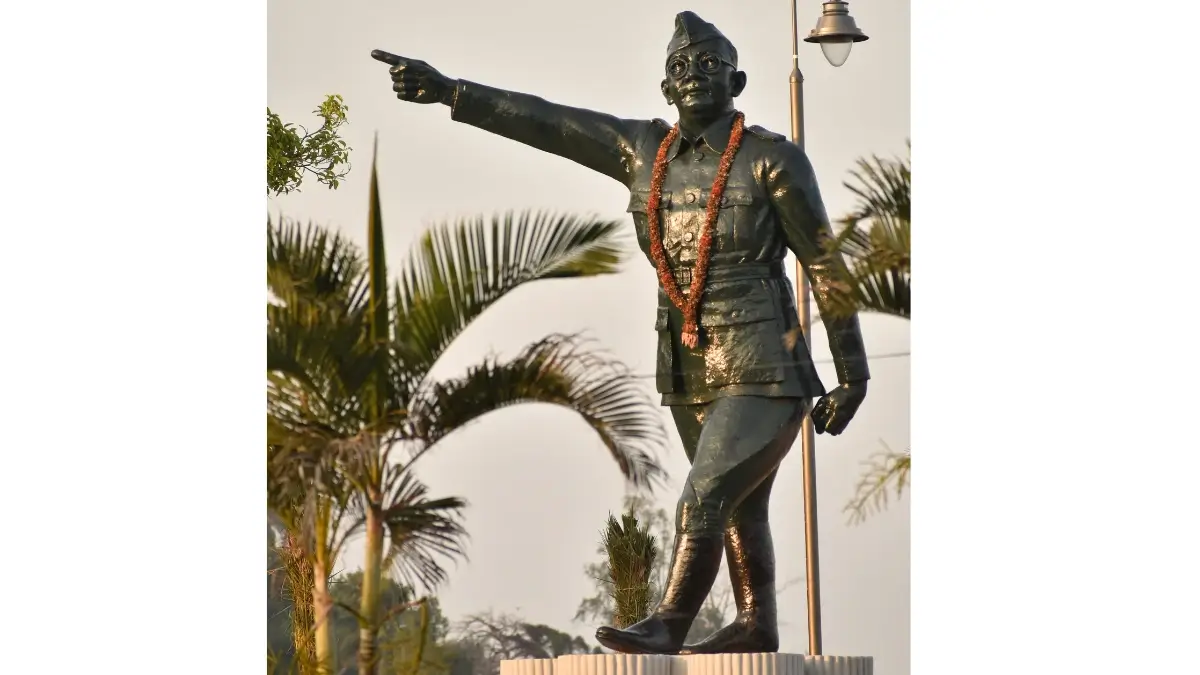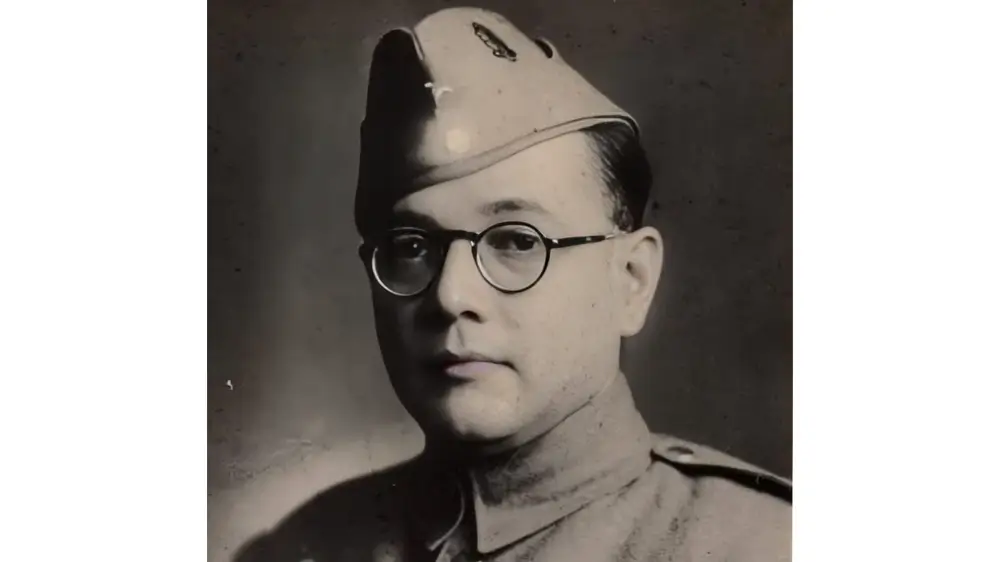General Speech on Netaji Subhas Chandra Bose: 10 Lines, Short and Long Speech
Subhash Chandra Bose, popularly known as Netaji, gained acclaim for delivering impactful speeches that ignited the flame of patriotism and spurred individuals to actively participate in the struggle for India’s independence. Among his memorable addresses is the iconic statement, “Give me blood, and I assure you freedom” delivered to the members of his Indian National Army in Burma during the pivotal year of 1944.
Every year on January 23, Subhas Chandra Bose’s birthday is commemorated across the nation as Subhas Chandra Bose Jayanti, this year on 23rd January Tuesday will be the 127th anniversary of his birth.

10 Line on Netaji Subhas Chandra Bose’s Birthday
- Netaji Subhas Chandra Bose, born on January 23, 1897, in Cuttack, Odisha, was a pivotal figure in India’s freedom struggle.
- He was a brilliant student, securing the second position in the matriculation exam and later completing his B.A Hons. in Philosophy in 1918.
- Despite being selected for the Indian Civil Service, Netaji chose to return to India and fight for its independence.
- The charismatic leader played a crucial role in shaping the Indian National Congress and later formed the Azad Hind Fauj.
- His famous slogan “Tum Mujhe Khoon Do, Mai Tumhe Azadi Dunga” reflects Netaji’s spirit of sacrifice and determination.
- Netaji’s contributions inspired millions to join the freedom struggle against British colonial rule.
- The circumstances of his death in a plane crash on August 18, 1945, remain surrounded by mystery.
- Subhas Chandra Bose Jayanti, celebrated on January 23, pays tribute to his unparalleled courage and dedication.
- Museums and institutions across India, including the Netaji Museum and Netaji Bhawan, stand as testaments to his indomitable spirit.
- Netaji’s legacy continues to inspire generations, reminding us of the sacrifices made for the freedom we cherish today.
Short Speech on Netaji Subhas Chandra Bose
Netaji Subhash Chandra Bose, born in 1897 in Cuttack, Orissa, emerged as a significant leader in India’s fight for freedom. A brilliant student, he secured the second position in his matriculation exam, showcasing early promise. After that he also completed his his B.A Hons. in Philosophy in 1918 from the University of Calcutta. Bose’s commitment to India’s independence led him to spearhead a radical faction in the Indian National Congress (INC) during the tumultuous 1920s and 1930s. Despite becoming the Congress President in 1938, differences with the party’s leaders prompted his departure in 1939, marking the beginning of his resolute quest for freedom.
After resigning, Bose faced house arrest by the British government. However, he did not waver. Making a daring escape in 1940, he sought refuge in Germany. Seeking support from the Nazi party to aid India’s liberation, Bose established Free India Radio in 1941, backed by Germany. Through charismatic speeches, Bose not only gained recognition but also ignited enthusiasm among Indians, both domestically and abroad.
Netaji Subhash Chandra Bose’s legacy is one of unwavering bravery, strategic brilliance, and a solid educational foundation, epitomizing his relentless pursuit of India’s freedom. His bold journey, from leading a radical group to forming alliances against the British, remains etched in history as a symbol of determination and dedication to the noble cause of independence.

Long Speech on Netaji Subhas Chandra Bose
We shall delve deeper into the extraordinary journey of a true patriot, Netaji Subhas Chandra Bose. His life is not just a chapter in our history books but a beacon of inspiration for generations to come. Born on January 23, 1897, in Cuttack, Odisha, Netaji’s story is an exemplary saga of courage, sacrifice, and an unwavering commitment to the cause of India’s independence.
Netaji’s academic brilliance set the foundation for a future that would shape the destiny of a nation. Securing the second position in the matriculation exam and completing his B.A Hons. in Philosophy in 1918, he demonstrated a keen intellect and an unwavering spirit. Yet, his journey was destined to transcend the boundaries of conventional success.
Despite being selected for the prestigious Indian Civil Service, Netaji chose to chart a different course. He relinquished the comforts of a stable career abroad, feeling an irresistible calling to fight for the freedom of his motherland. This pivotal decision marked the commencement of a journey that would redefine the course of India’s struggle against colonial rule.
Netaji’s charisma and powerful personality inspired a generation to rise against the shackles of oppression. His contributions are not mere footnotes in history but resonate in the formation of the Azad Hind Fauj, a military regiment with a singular goal – liberating India. The famous slogan “Tum Mujhe Khoon Do, Mai Tumhe Azadi Dunga” became more than a rallying cry; it became the heartbeat of a nation yearning for freedom.
Even in the face of adversity, Netaji’s commitment to the cause remained unshaken. His leadership played a crucial role in shaping the Indian National Congress, and later, the Azad Hind Fauj became a symbol of resistance against colonial forces. His legacy is not just about victories and defeats but about the spirit of resilience that defines the very essence of India’s fight for independence.
As we commemorate Netaji Subhas Chandra Bose Jayanti, let us not merely remember a historical figure but embrace the values he stood for. Courage, sacrifice, and dedication are not relics of the past but guiding principles for us as we navigate through our lives. Netaji’s life is a testament to the power of one individual’s determination to bring about change. It is our responsibility to carry that flame forward, to stand up against injustice, and to contribute positively to the growth and development of our nation.
Netaji’s legacy extends beyond the annals of history. It lives in the hearts of every Indian who cherishes the hard-fought freedom we enjoy today. His life teaches us that each of us has the power to make a difference, that the path less travelled is often the one that leads to greatness.
Jai Hind!
You may also Read our Finance, World News, Local News, Health, Food, Education articles.

